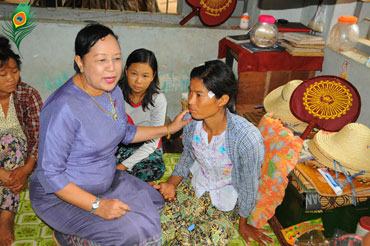Sagaing Region Chief Minister Tha Aye said that the local government does not have the right to stop the “Kyayni Muntain” copper mine project in Monywa District.
 But he said a long-term solution needs to be found to the strike, which has seen thousands of villagers demonstrate in opposition to the mine and to land confiscation by the authorities, according to one of the leaders of the 88-Generation students group, who met with the minister told Mizzima.
But he said a long-term solution needs to be found to the strike, which has seen thousands of villagers demonstrate in opposition to the mine and to land confiscation by the authorities, according to one of the leaders of the 88-Generation students group, who met with the minister told Mizzima.
Kyaw Min Yu, a leader of the 88-Generation Student Group in Rangoon who came to Monywa to help facilitate the release, took part in the release of three protesters.
"Thwe Thwe Win, Aye Net, and Phyu Phyu Win were released from Monywa and now they are in the car with me, on the way to Wethme village,” he said as he was driving them from the detention center, according to a report by Radio Free Asia (RFA) on Friday.
A fourth activist, Wai Lu, a member of a Rangoon-based activist group helping organize local farmers who live near the mine to protect their land rights, was released from detention in nearby Chaung Oo township, said RFA.
Kyaw Min Yu, also known as Ko Jimmy, said the minister made the remark about a long-term solution on Wednesday during a meeting that included the Sagaing Region’s Forestry and Environmental Conservation Minister Than Htike and MP Thaung Sein of Sagaing Region Assembly.
Meanwhile, members of the All Burma Federation of Student Unions (ABFSU) in Monywa have made a three-point demand that includes allowing villagers of Wet Hmay Village who took refuge at Myomagat Buddhist monastery last week to safely return to their village, not to harass ABFSU students who have participated in the protest against the mine project and to shut down the project.
Jimmy said the chief minister agreed to all the demands except the closure of the project.
On Sept. 10, 12 protestors were arrested after they staged a protest against the copper mine project, and on the same day, residents in Monywa and villagers from Wet Hmay staged a protest demanding their release.
A female protestor San San Hla, 27, a Wet Hmay villager who was recently released, told Mizzima, “We were arrested cruelly as if we were dogs, and then we were taken into custody. Policewomen were very aggressive. They scratched at us. They pulled our hair. So, we shouted ‘save us’. We don’t know where they took the remaining three protestors. But we were released.”
About 30 villagers from Wet Hmay Village, who took part in the protest, sought shelter at Myomagat Monastery in Monywa rather than return to their village. The National League for Democracy [Monywa branch], the ABFSU of Monywa and the 88-Generation students group have provided food for the women.
A monk at the monastery told Mizzima that Monywa’s Sangha Nayaka Committee [a government-appointed body of high-ranking Buddhist monks] sent a letter telling the monastery not to open a camp for the protestors.
On Sept. 7, villagers of Wet Hmay Village staged a protest demanding the closure of the “Kyayni Mountain” copper mine project and for the authorities to return their confiscated land.
“Even if [they] want to give compensations for confiscated land, we don’t want it. We don’t want to lose the Kyayni Mountain. And we don’t want to leave this land. We want to scrape a living using this land. That’s why we staged the protested,” Chan Moe, who took part in the protest, told Mizzima.
The Union of Myanmar Economic Holdings Limited and China’s Wan Bao Mining Company jointly operate the Kyayni Mountain copper mine project.
An 88-generation student, Myo Thant, told Mizzima that about 200 households from four villages around the area near Latpadaung Mountain have been moved because of the copper mine project.



